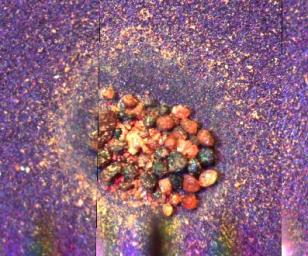
|
Microscope Image of Scavenged Particles
- Click the image above for a larger view
- Full-Res JPEG (397 x 330) (45.7 kB)
- Full-Res TIFF (397 x 330) (393.7 kB)
Caption:
This image from NASA's Phoenix Mars Lander's Optical Microscope shows a strongly magnetic surface which has scavenged particles from within the microscope enclosure before a sample delivery from the lander's Robotic Arm. The particles correspond to the larger grains seen in fine orange material that makes up most of the soil at the Phoenix site. They vary in color, but are of similar size, about one-tenth of a millimeter.
As the microscope's sample wheel moved during operation, these particles also shifted, clearing a thin layer of the finer orange particles that have also been collected. Together with the previous image, this shows that the larger grains are much more magnetic than the fine orange particles with a much larger volume of the grains being collected by the magnet. The image is 2 milimeters across.
It is speculated that the orange material particles are a weathering product from the larger grains, with the weathering process both causing a color change and a loss of magnetism.
Background Info:
The Phoenix Mission is led by the University of Arizona, Tucson, on behalf of NASA. Project management of the mission is by JPL, Pasadena, Calif. Spacecraft development was by Lockheed Martin Space Systems, Denver.
Photojournal Note: As planned, the Phoenix lander, which landed May 25, 2008 23:53 UTC, ended communications in November 2008, about six months after landing, when its solar panels ceased operating in the dark Martian winter.
Cataloging Keywords:
| Name | Value | Additional Values |
|---|---|---|
| Target | Mars | |
| System | ||
| Target Type | Planet | |
| Mission | Phoenix | |
| Instrument Host | Phoenix Lander | Phoenix Mars Lander |
| Host Type | Lander | |
| Instrument | Microscopy, Electrochemistry, and Conductivity Analyzer (MECA) | Robotic Arm |
| Detector | ||
| Extra Keywords | Color, Magnetosphere | |
| Acquisition Date | ||
| Release Date | 2008-09-30 | |
| Date in Caption | ||
| Image Credit | NASA/JPL-Caltech/University of Arizona/Imperial College London | |
| Source | photojournal.jpl.nasa.gov/catalog/PIA11204 | |
| Identifier | PIA11204 | |
